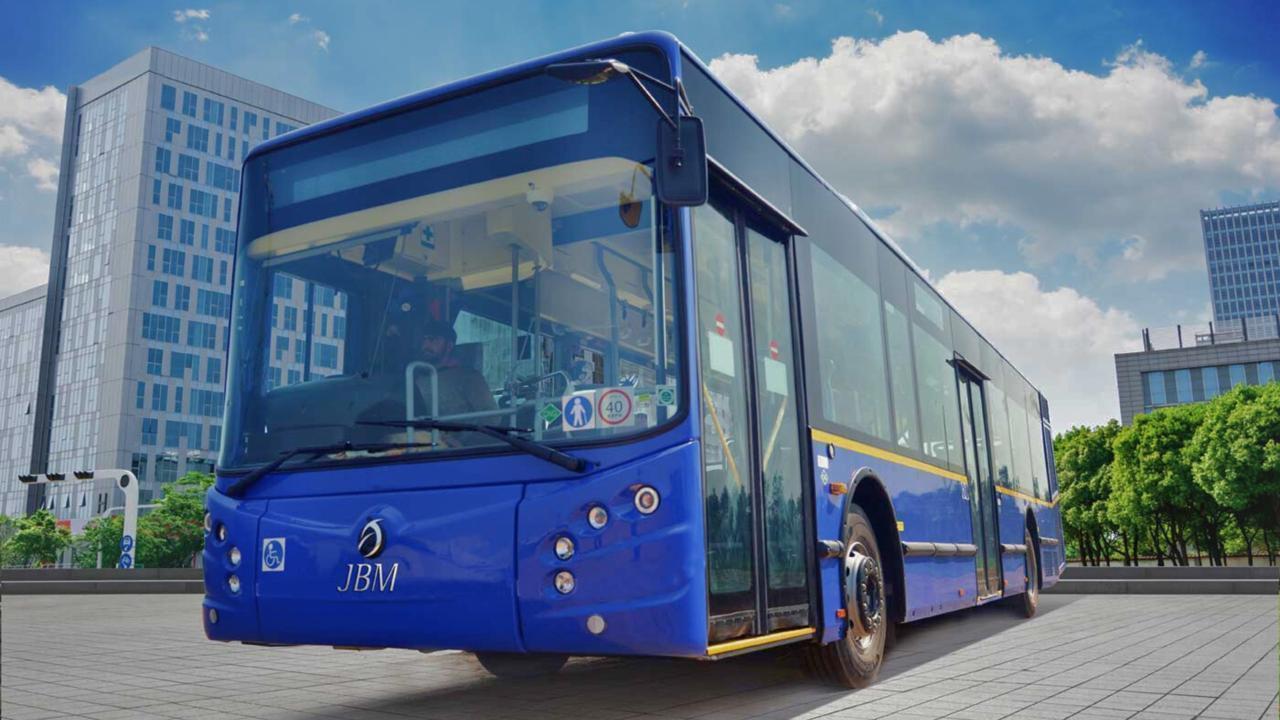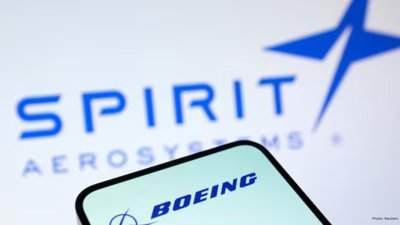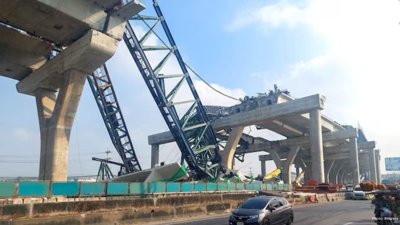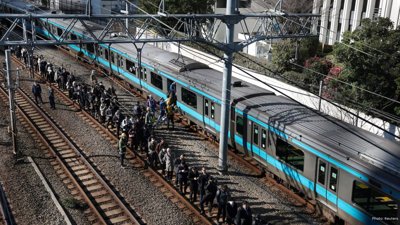
Post by : Amit
Photo:Jbm Group
Frankfurt, June 2025 — In a landmark moment for India’s green mobility ambitions, the homegrown industrial powerhouse JBM Group has unveiled its cutting-edge Ecolife electric city bus at the prestigious UITP Global Public Transport Summit, signaling not only its first major foray into the highly competitive European market but also a bold new chapter in the company’s international growth story. With the global transition toward sustainable urban mobility accelerating, JBM’s entry could not have come at a more pivotal time.
Unveiled amidst an audience of public transport authorities, mobility innovators, and policy leaders, the JBM Ecolife bus is more than just another electric vehicle—it is a statement of intent. Designed to meet the highest European standards, the Ecolife brings together environmental responsibility, passenger comfort, and advanced technology in a way that positions JBM as a credible challenger to established European bus makers.
At the heart of the Ecolife’s appeal lies its impressive technical prowess. The bus boasts an extraordinary range of up to 400 kilometers on a single charge, made possible by its advanced modular lithium-ion battery packs, complemented by ultra-fast charging capabilities. This extended range, combined with efficient regenerative braking, ensures that the Ecolife is well-suited for intensive urban operations without the need for frequent recharging—solving one of the biggest challenges faced by public transit authorities considering electric fleets.
The vehicle’s robust monocoque stainless-steel construction ensures durability while maintaining a lightweight profile, optimizing both performance and energy consumption. The bus is also equipped with an array of modern safety features, including Advanced Driver Assistance Systems (ADAS), Autonomous Emergency Braking System (AEBS), collision and lane departure warnings, blind-spot detection, fire suppression systems, and a comprehensive 360-degree camera coverage. These features not only enhance operational safety but also meet stringent European Union regulations, making the Ecolife a top contender for cities aiming to modernize their transit systems without compromising on safety or efficiency.
One of the Ecolife’s most distinctive features is its eco-conscious interior design. JBM has made a deliberate decision to use recycled materials for seating and interior fabrics, underscoring its commitment to sustainability at every level. The passenger experience has also been prioritized with ergonomic seating, low floor accessibility, and climate control—ensuring that public transport can be both green and comfortable.
Recognizing the importance of having a strong local presence in Europe, JBM has simultaneously announced the opening of its new regional headquarters in Frankfurt. This strategic hub will oversee all aspects of JBM’s European operations, including sales, marketing, after-sales support, operations, and partnerships. The Frankfurt base will be helmed by Daniel Frade, an industry veteran with extensive experience in the European mobility sector, a move that signals JBM’s serious commitment to embedding itself within the continent’s transportation ecosystem.
One of JBM’s most notable strategic moves has been its leasing partnership with KazenMaier, a prominent mobility solutions provider in Germany. This collaboration aims to deploy over 100 Ecolife electric buses across German cities in the coming years, utilizing a full-stack approach that combines not only vehicles but also charging infrastructure, battery management systems, and flexible financing solutions. This integrated ecosystem reflects JBM’s belief that electric mobility success requires more than just delivering buses—it necessitates creating an end-to-end solution that supports operators from day one.
JBM is not a newcomer to the field of electric buses. With more than 11,000 buses already deployed globally, the company brings extensive experience to the European market. Its manufacturing facilities in India are among the largest in Asia, capable of producing up to 20,000 buses per year. These facilities have powered JBM’s rise as a key player in India’s electrification of public transportation and are now positioned to serve its expanding international clientele.
The impact of JBM’s electric buses extends beyond commercial success. According to the company, its buses have collectively logged over 165 million electric kilometers globally, serving more than one billion passengers and saving approximately 350 million liters of diesel fuel. This, in turn, has prevented over one billion kilograms of CO₂ emissions from entering the atmosphere—figures that highlight the company’s tangible contribution to global climate action.
Looking ahead, JBM has set ambitious targets: by the next three to four years, the company aims to achieve three billion electric kilometers served and to transport ten billion passengers across its fleets. These milestones align with JBM’s broader commitment to achieving carbon neutrality by 2040 and directly support several of the United Nations Sustainable Development Goals (SDGs), including Goal 3 (Good Health and Well-being), Goal 9 (Industry, Innovation, and Infrastructure), Goal 11 (Sustainable Cities and Communities), and Goal 13 (Climate Action).
Central to JBM’s strategy is its E-Verse platform—a holistic ecosystem that integrates electric vehicles, energy management, charging solutions, and advanced fleet support systems. This modular approach is designed to help cities, transit agencies, and private operators make a seamless transition to zero-emission public transport without the typical hurdles of high upfront costs, lack of charging infrastructure, or operational disruptions.
By offering flexible business models such as leasing, Battery-as-a-Service (BaaS), and comprehensive maintenance packages, JBM ensures that its customers can focus on their core mission—delivering reliable public transportation—while JBM handles the technical complexities of electric vehicle operation.
JBM’s arrival in Europe also reflects a broader shift in global mobility trends, where Indian manufacturers are increasingly stepping onto the international stage. Traditionally dominated by European giants such as Volvo, Mercedes-Benz, and Solaris, the electric bus market in Europe is now witnessing new entrants like JBM that bring cost-competitive, technologically advanced, and sustainability-focused solutions to the table.
The European Union’s push for cleaner urban mobility, backed by regulatory frameworks and green financing incentives, creates an ideal environment for companies like JBM to thrive. With cities under pressure to meet air quality and emission targets, electric buses represent a critical piece of the puzzle, and JBM’s Ecolife arrives at precisely the right moment to capture this growing demand.
Industry analysts have lauded JBM’s comprehensive approach, noting that while many new entrants focus solely on vehicles, JBM’s inclusion of infrastructure, energy management, and financial flexibility gives it a unique advantage. “JBM is not just selling buses—it’s offering a mobility-as-a-service model,” said one European transit expert. “That’s a game-changer in this market.”
As JBM sets its sights on Europe, its leadership is clear-eyed about the challenges ahead, from regulatory compliance to market competition. Yet with a solid track record, proven manufacturing scale, and a genuine commitment to sustainability, the company is well-positioned to disrupt Europe’s green mobility landscape.
The unveiling of the Ecolife at UITP marks not just a product launch but a strategic declaration: India’s mobility champions are ready to compete on the world stage, bringing with them the innovation, scale, and environmental consciousness needed to redefine urban transportation for a greener, cleaner future.
#trending#latest#JBMGroup#EVBuses#ElectricMobility#SustainableTransport#GreenUrbanMobility#FrankfurtHQ#EuropeanEVMarket#ZeroEmissionBus#SmartCityTransport#EcolifeBus










Advances in Aerospace Technology and Commercial Aviation Recovery
Insights into breakthrough aerospace technologies and commercial aviation’s recovery amid 2025 chall

Defense Modernization and Strategic Spending Trends
Explore key trends in global defense modernization and strategic military spending shaping 2025 secu

Tens of Thousands Protest in Serbia on Anniversary of Deadly Roof Collapse
Tens of thousands in Novi Sad mark a year since a deadly station roof collapse that killed 16, prote

Canada PM Carney Apologizes to Trump Over Controversial Reagan Anti-Tariff Ad
Canadian PM Mark Carney apologized to President Trump over an Ontario anti-tariff ad quoting Reagan,

The ad that stirred a hornets nest, and made Canadian PM Carney say sorry to Trump
Canadian PM Mark Carney apologizes to US President Trump after a tariff-related ad causes diplomatic

Bengaluru-Mumbai Superfast Train Approved After 30-Year Wait
Railways approves new superfast train connecting Bengaluru and Mumbai, ending a 30-year demand, easi